
Is there a link between cannabinoids and traumatic brain injury? How can I help a loved one dealing with TBI? It has to do with those tiny compounds in cannabis called “cannabinoids”.
Headaches, brain fog, emotional changes, and even memory loss are common symptoms of someone experiencing traumatic brain injury (TBI).
While traditional medications may help relieve some symptoms, many people are leaning toward more natural alternatives, such as medical cannabis.
The latest scientific findings from 2023 on cannabinoids and traumatic brain injury suggest possible therapeutic effects that'll surprise you! According to preclinical evidence, endocannabinoids may protect brain cells and reduce inflammation, while CBD (cannabidiol) may boost cognition.
We'll discuss CBD brain healing, what scientists have currently found, and how you or a loved one may reap the medical benefits of cannabis.
You'll also find out how Texas 420 Doctors can help you reach your health goals faster and easier, in just a few simple steps.
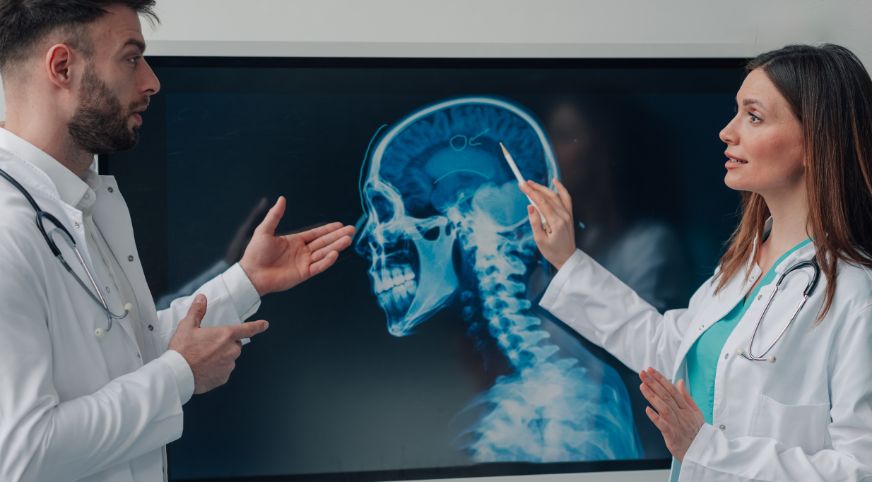
What is TBI and does medical-grade cannabis for concussions work? Let’s take a look at the latest facts.
Traumatic brain injury, or just simply "TBI", is an injury type that happens when a person is hit with a sudden force, like a bump to the head, jolt, or blow, which disrupts the normal functioning of the brain.
For example, some people experience TBI due to things like violence, sports injuries, falls, or commonly, car accidents.
Some people experience mild symptoms of TBI, commonly called "a concussion", while less fortunate people deal with more severe injuries, including long-term disability and even death.
The most common symptoms people with TBI experience are emotional changes, loss of memory (which can be partial and sometimes complete loss), physical movement, and sleep disruptions.
Milder cases of TBI may also lead to lasting effects, especially if the person experiences multiple injuries. Approximately two million people in the United States deal with a form of TBI every year.
According to the statistics, it is the number one cause of disability and death in people younger than 45. These stats show that TBI happens more often than multiple sclerosis (MS), AIDS, and breast cancer.
There are many other possible short and long-term side effects of experiencing TBI. For example, more serious cases may lead to post-traumatic stress disorder (PTSD), anxiety and depression, cognitive decline, and seizures.
Many people end up with lifelong symptom management, and often, traditional medicines simply don’t work effectively. As such, many have been investigating the potential benefits of cannabis for concussions.
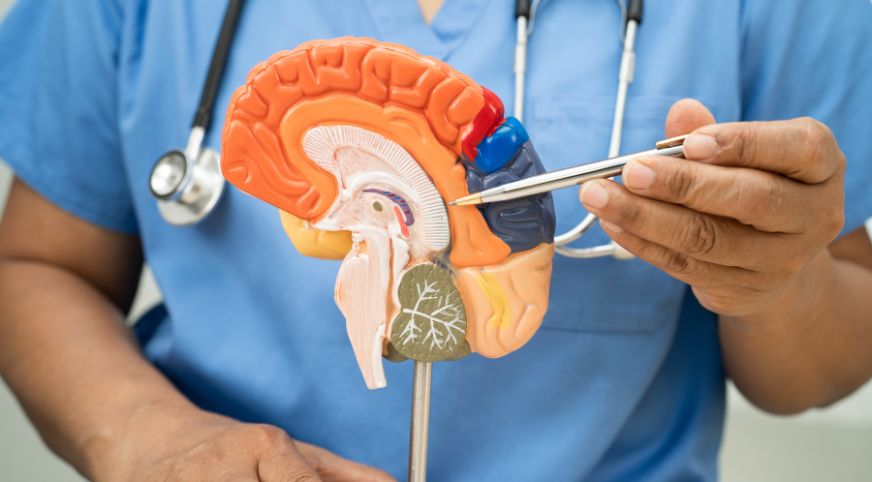
All of us have an endocannabinoid system (or "ECS" for short). It's a network of receptors (CB1 and CB2) that's present throughout our bodies, including the brain.
Here's what you must know about the ECS and what it has to do with the effects of CBD on the brain.
The endocannabinoid system plays a major role in regulating several vital functions in the body, including inflammation, pain perception, memory and learning, and mood. It is also involved in regulating neuroprotection.
CBD (cannabidiol, the non-psychoactive, wellness-focused cannabinoid) and THC (tetrahydrocannabinol, the psychoactive compound in marijuana) interact with the receptors to help maintain balance in the body (called "homeostasis").
Balance is always important, but even more so after experiencing an injury like TBI. Below, you’ll find out more about CBD effects on the brain and why it’s so important for TBI patients.
Does CBD heal the brain? While most of the research on cannabinoids and traumatic brain injury has been performed on animals, human studies also point to possibly impressive results.
For example, evidence reveals that CBD has powerful anti-inflammatory and antioxidant properties which may fight chronic neuroinflammation and oxidative stress. Also, other animal-based findings concerning CBD brain healing show that the use of endocannabinoids is a promising option for TBI treatment.
For example, rodent-model studies showed that treatment with cannabidiol resulted in less inflammation, better motor and cognitive functions, and improved blood-brain barrier integrity after traumatic brain injury.
Overall, researchers found that potential CBD effects on brain health include:
This is why so many people are interested in the effects of CBD on the brain, not just for managing the symptoms of TBI, but for possible long-term healing. Keep in mind, currently, there is no cure for this serious condition. However, symptom management is possible.
So, can CBD heal the brain? It might. While more research on humans is needed, the current evidence concerning cannabinoids and TBI management is incredible.
Remember that CBD is not a cure, BUT it can help support mood stability, sleep, and focus. So, when it comes to cannabinoids and traumatic brain injury it’s important to know that CBD might be an excellent addition to a larger recovery plan.
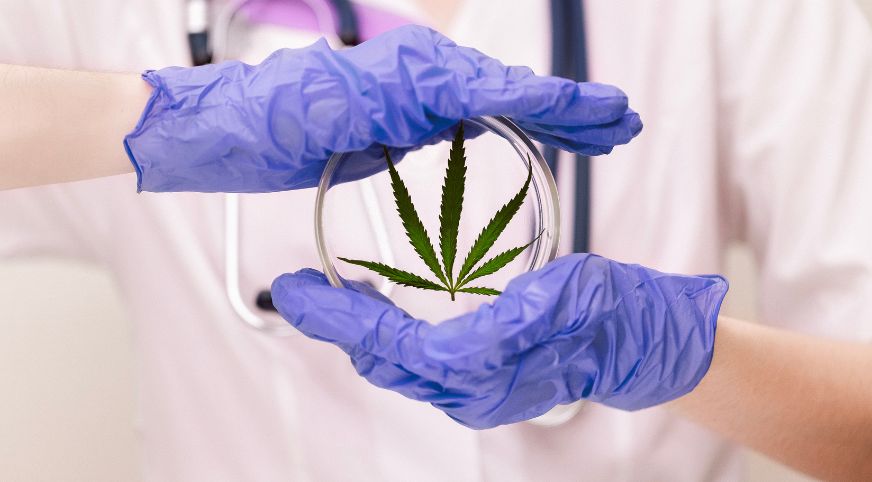
We’ve discussed earlier that a concussion is a milder form of TBI. So, could cannabis for concussions possibly work? Let’s take a look at the possible benefits.
Even milder forms of TBI may come with ripple effects, and possible long-term sleep problems, sensory sensitivity, and irritability.
Can weed help a concussion? It's possible, especially when using quality, CBD-rich formulas. While THC products may not be suitable for every patient, CBD offers symptom relief without intoxication.
Proven benefits of cannabidiol products include reduced headache severity, increased wellness, calmer thoughts, improved restorative sleep, and reduced inflammation in the body.
Is cannabis for concussions effective? Many people are wondering about the answers, including athletes. Many sports professionals from the MMA and NFL communities are vocal supporters of cannabis for concussions, focusing on the calming and anti-inflammatory effects of the natural therapy.
Similarly, many military veterans dealing with post-concussive syndrome are advocating for access to CBD and medical marijuana through official medical channels such as Texas CUP.
The Compassionate Use Registry of Texas, or "CURT" is the digital system that's maintained by the Texas Department of Public Safety. It's the state's medical cannabis program.
Instead of getting a physical MMJ card, like in states such as Utah, a qualified cannabis doctor enters the marijuanas prescription directly into CURT (The Compassionate Use Registry of Texas).
From there, qualified patients may access low-THC cannabis products that contain a maximum of 0.5% THC by weight. Smoking or vaping cannabis is strictly prohibited in this US state.
If you are interested in cannabinoids and traumatic brain injury and you’re thinking about cannabis-based treatment, you need to go through this process. Many first-timers trying to navigate this process feel confused and even daunted.
However, it doesn’t have to be like that! Look for a reliable “medical cannabis doctor near me”. But you won’t have to search too long, though!
Let Texas medical marijuanas doctors help you.

According to Texas law, the list of qualifying conditions includes PTSD, epilepsy, multiple sclerosis, and seizures. Unfortunately, you'll see that traumatic brain injury is not specifically included.
Does this mean that you can't reach out to a trusted marijuana doctor for TBI in Texas? Not really.
Traumatic brain injury isn't explicitly named under Texas law, but you may still receive treatment if eligible.
Since many symptoms of TBI overlap with approved conditions such as PTSD and neurological disorders, you may still qualify for low-THC cannabis in the state and get legal products with the help of a 420 doctor.
Texas medical marijuanas doctors are here to simplify the entire process for you, from the start to the finish. You can schedule your first appointment with a qualified medical professional online or call +1.833.420.1710.
We offer professional, qualified advice and ongoing support to help you access quality medical cannabis safely. All our doctors are board-certified physicians registered with the CURT. Here's how you can access your medical marijuana prescription in Texas in no time.

If you are interested in CBD brain healing, our medical cannabis doctors in Texas can help you. Texas 420 Doctors are the most popular choice for anyone considering this alternative treatment method, and here is why.
Make sure to schedule an appointment today with an expert QMP!
In Texas, only medical marijuana is legal, recreational is not. Only certain forms of cannabis products are available at state dispensaries for eligible patients.
If you are interested in cannabinoids and traumatic brain injury and you're considering marijuana treatment in Texas, you need to know that only low-THC products are permitted.
Approved formats containing a total of 0.5% THC or less include tinctures, capsules, oils, and lozenges.
Again, vaping or smoking marijuana is illegal in Texas.
Most patients with TBI eager to try medical cannabis lean towards CBD-forward, low-THC products. These offer gentle effects and won't produce the powerful psychoactive effect that comes with THC. We recommend the following products for TBI.
If you are new to the topic of cannabinoids and traumatic brain injury, allow us to help you. Our expert providers can help determine the best formula and dosing plan according to your needs and preferences.
Consider CBD brain healing, book your first appointment with a highly compassionate medical professional, and get started today!
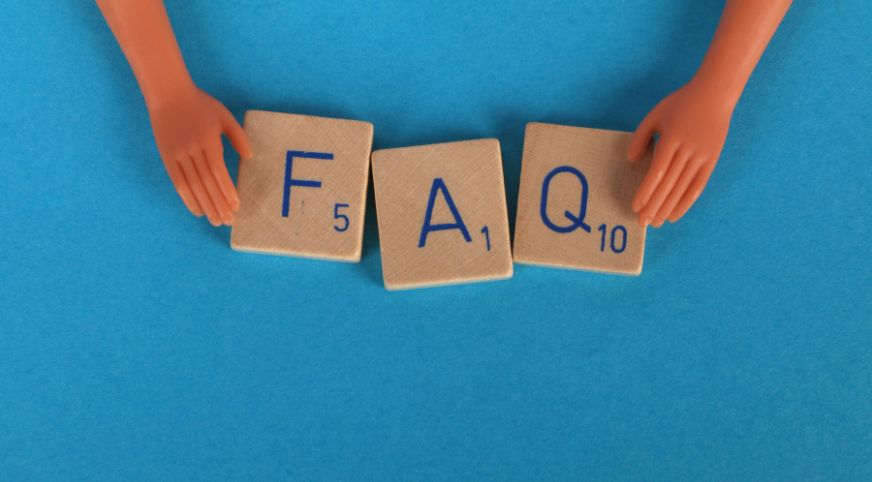
According to early research and anecdotal reports, cannabis may help manage symptoms of brain injuries, like inflammation, sleep disturbances, and pain.
However, it's not a standalone treatment! Always consult a qualified medical provider to determine if it's the right choice for you.
Strains high in CBD and low in THC, such as Harlequin, Charlotte's Web, and ACDC may help relieve anxiety, brain fog, and inflammation. These are popular strains for experiencing the therapeutic effects of cannabis without potent psychoactive effects.
We recommend combining occupational therapy, neurological rehabilitation, speech therapy, and psychological support for long-term success.
Quality, low-THC medical cannabis may serve as a complementary therapy to ease symptoms and improve a TBI patient's life quality.
Yes, cannabis may provide help for patients with neurological disorders. The benefits are largely related to neuroprotection, improved mood regulation, and inflammation control.
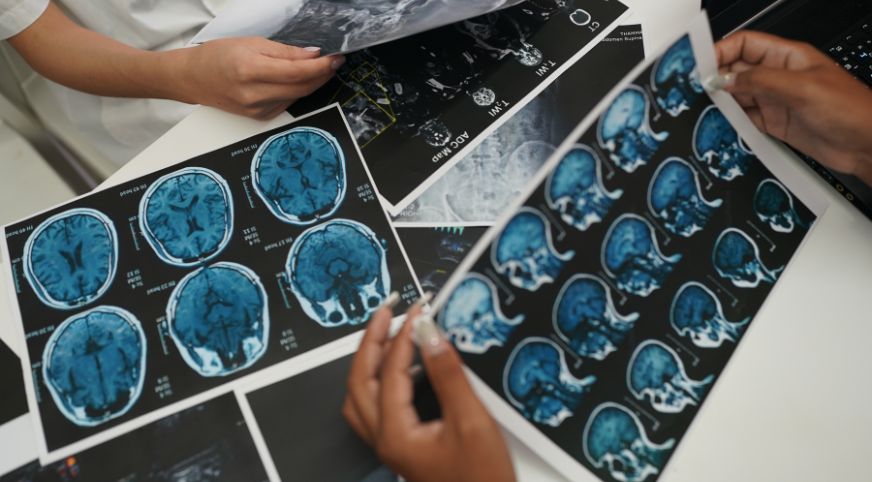
The scientific evidence on cannabis and concussion treatment is impressive, as it showcases the potential benefits of cannabidiol-rich, low-THC products for cognition, mood, sleep, and inflammation.
While the research is still in its development stage, early results and patient feedback show that CBD brain healing is not "a trendy hype". It's a possible option for managing TBI symptoms and improving overall life quality.
Our highly compassionate team at Texas 420 Doctors is here to guide you through the entire process: From eligibility to ongoing care. If you or someone you care about is dealing with post-TBI symptoms, know that there is hope.
Opt for a natural, legal treatment option, and book your first consultation with reliable medical weed doctors today.
